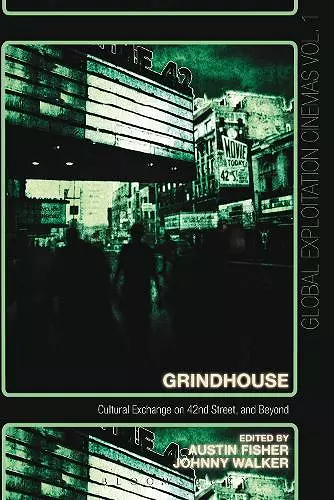Grindhouse
Cultural Exchange on 42nd Street, and Beyond
Johnny Walker editor Prof Austin Fisher editor
Format:Paperback
Publisher:Bloomsbury Publishing PLC
Published:22nd Sep '16
Currently unavailable, and unfortunately no date known when it will be back

Examines, with historically informed nuance, the myriad routes of cultural influence that converged in the American ‘grindhouse’ phenomenon and its aftermath.
The pervasive image of New York’s 42nd Street as a hub of sensational thrills, vice and excess, is from where “grindhouse cinema,” the focus of this volume, stemmed. It is, arguably, an image that has remained unchanged in the mind’s eye of many exploitation film fans and academics alike. Whether in the pages of fanzines or scholarly works, it is often recounted how, should one have walked down this street between the 1960s and the 1980s, one would have undergone a kaleidoscopic encounter with an array of disparate “exploitation” films from all over the world that were being offered cheaply to urbanites by a swathe of vibrant movie theatres. The contributors to Grindhouse: Cultural Exchange on 42nd Street, and Beyond consider “grindhouse cinema” from a variety of cultural and methodological positions. Some seek to deconstruct the etymology of “grindhouse” itself, add flesh to the bones of its cadaverous history, or examine the term’s contemporary relevance in the context of both media production and consumerism. Others offer new inroads into hitherto unexamined examples of exploitation film history, presenting snapshots of cultural moments that many of us thought we already knew.
The Grindhouse is a fascinating phenomenon but it is too often seen as a wild and eclectic one, something that is praised for being chaotic and anarchic. The current collection goes beyond this celebratory rhetoric to examine the multiple forms and histories that converge in the Grindhouse. It unpicks and unpacks the phenomenon in ways that demonstrate its richness and variety, but also make sense of that richness and variety. Most significantly, it does so without destroying the pleasures of the Grindhouse. On the contrary it manages to question the experience while preserving its sense of fascination. And that is a very rare thing. * Mark Jancovich, Professor of Film and Television Studies, University of East Anglia, United Kingdom *
Grindhouse sets a new standard for the study of exploitation cinema history. In a time when grindhouse aesthetics have become retro chic, this book moves us beyond the seedy, cult mythologies of grindhouse. Examining grindhouse cinema beyond myth and morality, beyond genre conventions or industrial norms, and even beyond the U.S. context, this collection takes a nuanced look at this complex body—no cadaver—of film history. The book demands that we interrogate how the turbulent racial, national and sexual politics of the 1960s to 1980s gave birth to a movement in cinema whose significance to the popular and film cultures of today cannot be underestimated. A tour de force and a must read for anyone interested in film on the (not so) perverse margins of cinema history. * Mireille Miller-Young, Associate Professor of Feminist Studies, University of California, Santa Barbara, USA *
ISBN: 9781628927498
Dimensions: unknown
Weight: 439g
280 pages